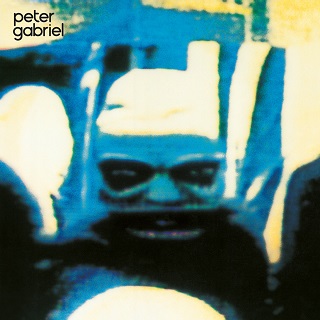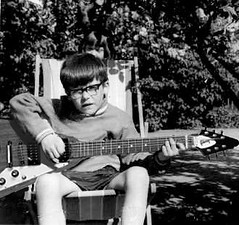Saturday, September 13, 2008

When all is considered, certainly at face value, one can hardly deny the fact that Peter Gabriel is a bit of a weirdo, a truly talented visionary, an innovator, but a weirdo none the less. From playing dress up fronting Genesis, to making music with primates, it's safe to say that Pete trods upon a different path, and damn am I glad of it.

Okay, 'weird' may be a bit strong, at least for his post Genesis career, but that flower outfit was weird, as were many of the costumes he appeared in on-stage in those days, and the reverse Mohawk was truly weird.

As far as his solo era is concerned, specifically those first four records, maybe unconventional might be a more fitting adjective.
In 1975, after the difficult birth of Genesis' 'The Lamb Lies Down On Broadway', Peter parted ways with Genesis, ostensibly to embark upon a film career. No movie ever surfaced, and by 1977 Peter had signed to the fledgling Geffen Records, and released his first solo record, the first self titled record, the album with the wet car on the cover.

Produced by Bob Ezrin, Wet Car, briefly reviewed here, in summary, is a truly great record, as well as home to Gabriel's first Classic Rock staple, 'Solsbury Hill'. Whereas I accept that the third record, Melting Face, is the strongest of the four, Wet Car is my favorite. There's a lot of big production numbers - Ezrin? Big production? Really? - some quirky arrangements that provide a link to his past work, and some really fantastic songs, 'Solsbury Hill', 'Modern Love', and 'Here Comes the Flood' stand out, but the whole thing is magic.

Robert Fripp, who appears on Wet Car as guitarist, was promoted to Producer for the second record. Released in 1978, Scratch suffers in comparison to Wet Car, mostly on the basis of the songs themselves. Scratch is much more introspective, quieter, and, well, weird. The record has grown on me over the years, and I do enjoy it, but outside of 'On The Air', 'DIY', and 'Exposure', it lacks punch. While Wet Car shows a great amount of musical diversity, on Scratch the diversity comes off as a bit meandering and unfocused.

For 1980's Melting Face, or Games Without Frontiers, as it is sometimes called, Gabriel brought in Steve Lillywhite to produce, but it was Gabriel's own notions of production that have earned him and engineer Hugh Padgham lasting recognition as innovators. Gabriel's vision was simple, no cymbals. No hi-hats, no crashes, no rides or splashes. The effect was two fold, it opened up the sound of the record, providing more space, a sharper focus, for the rest of the instrumentation, and notably, Peter's amazing voice. The great innovation, however, came accidentally. During a drum take, while the talk-back mic was on, Phil Collins hit his snare. The sound of that snare in the control room, passing through the massive compression of the talk-back system, created a sound that captivated Peter. In response, Hugh Padgham rigged up a similar compression scheme for the snare mic. They then added a noise gate, and created the soon to be ubiquitous 'Gated Snare' sound, an effect that would not have worked in conjunction with cymbals.
Melting Face contains two of Peter's more well known songs of the pre-'So' era, 'Games Without Frontiers', and 'Biko', while 'I Don't Remember', and 'Family Snapshot' stand out as wonderful compositions, and help to earn the record the outstanding status it enjoys. Melting Face is also a much more focused record, at least thematically, largely dealing with racism, exclusion, and social outsiders, culminating with the ultimate statement that is 'Biko'.

The last of the bunch, 1982's 'Security' provided Peter with his biggest hit yet, 'Shock the Monkey'. At the same time, the album is Peter's weirdest post Genesis LP. From tribal rhythms to ethereal ambiance, there was simply nothing conventional about it. Again, Peter the innovator, Gabriel the great embracer of technology, showed his pioneering ethos in the recording of 'Security' by being one of the first to go digital, as well as the use of sampling, another infant technology at the time.
After a big tour and a resulting live record, Gabriel cocooned for a bit, only to emerge in 1986 as the great entertainer with one of the biggest records of the decade, but that's another story, those records have names, weird one's too.
flamadiddle.
When I went to England for junior term abroad in 1989, I made a cassette copy of Wet Car from my LP. What I didn't know until I got to England was that the record had a skip during the lush ending of "Humdrum," extending what is really only about :30 on the record to seven or eight minutes. By the end of my stay in England, I had started to enjoy the hypnotic quality of the skip and would listen to it all the time.

